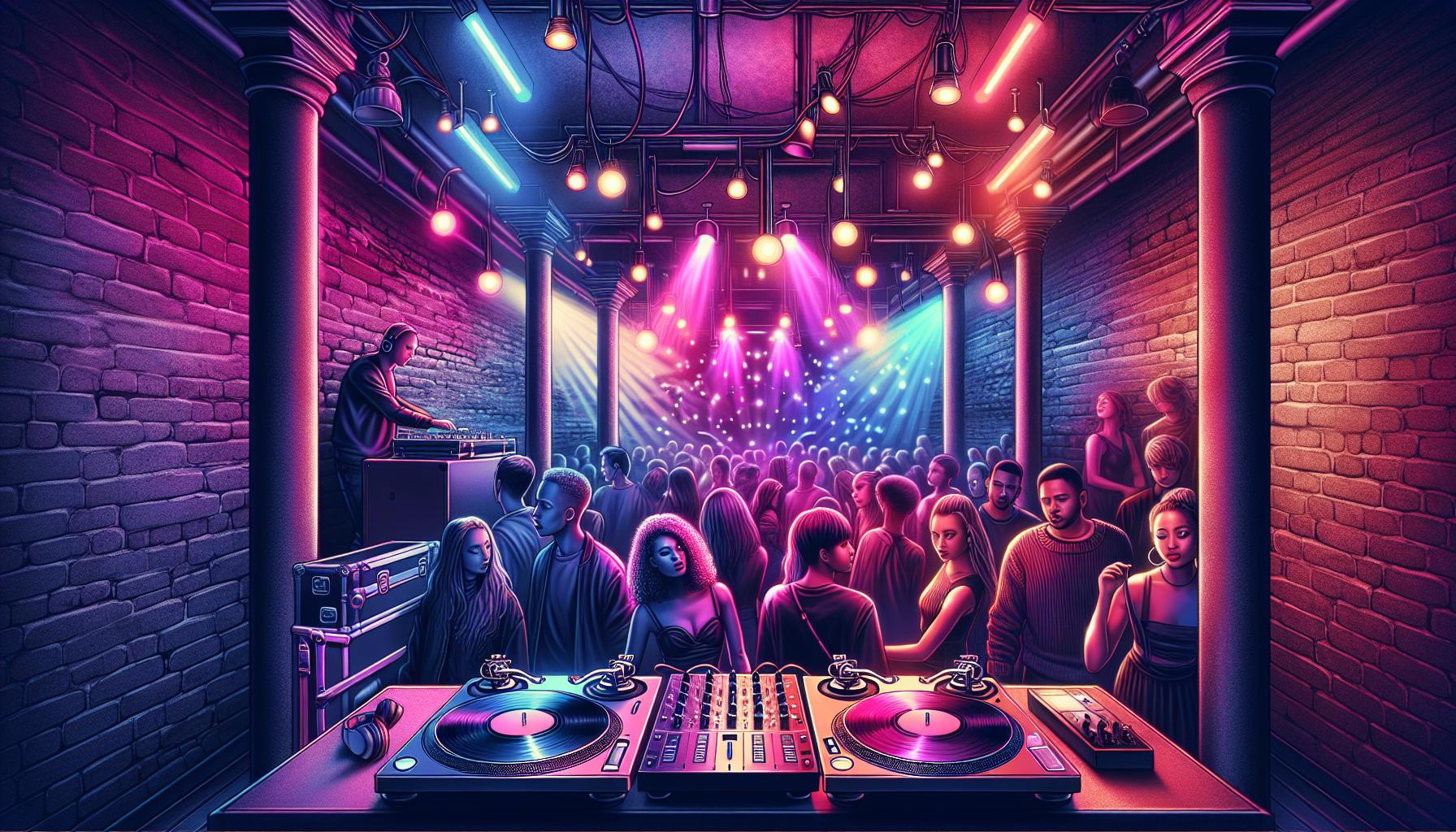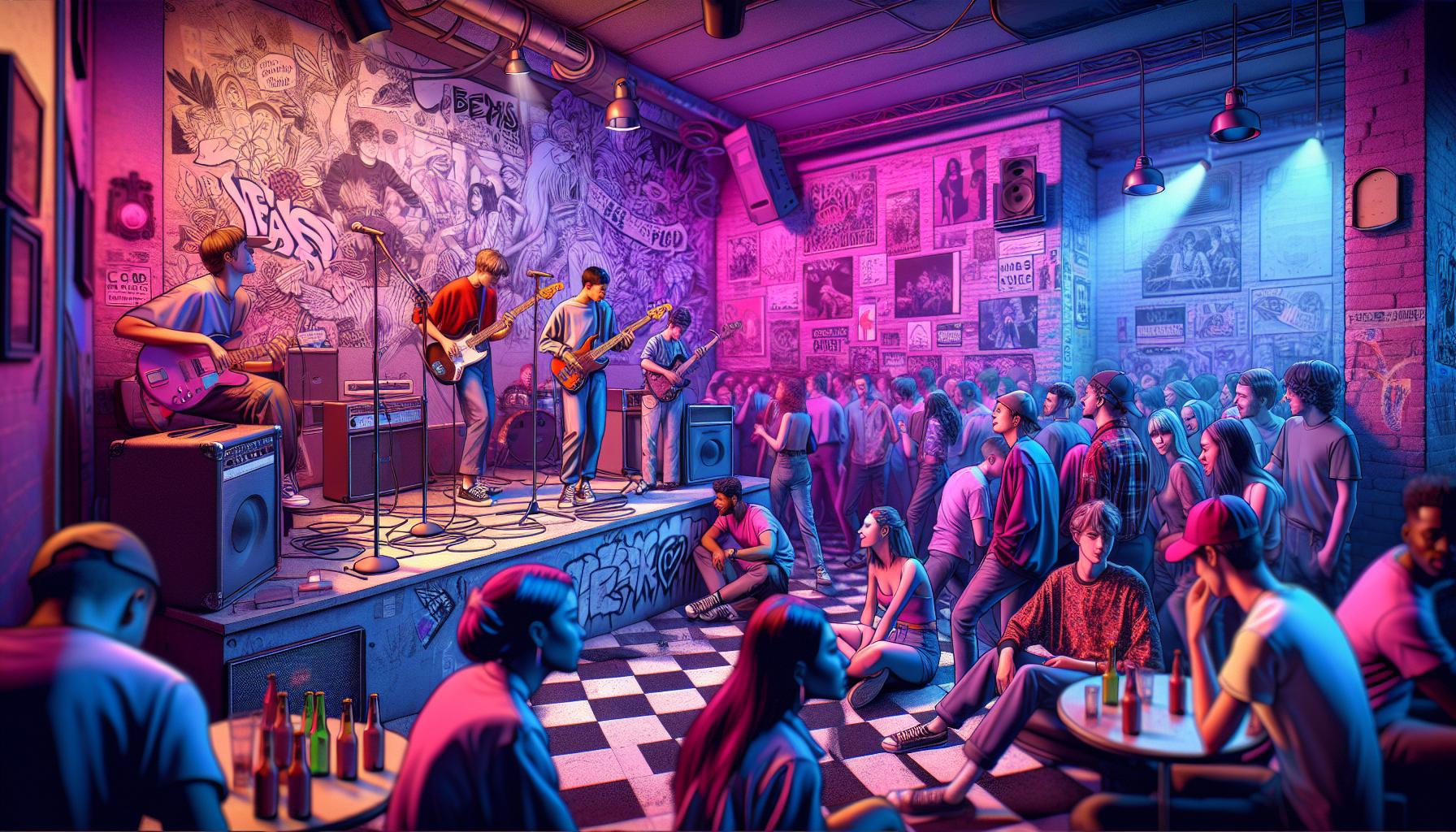Are you passionate about underground music and dream of running a successful club? Booking the right acts while maintaining profitability can be a challenging balancing act. It’s essential to understand the local scene, build relationships with artists, and create an atmosphere that keeps patrons coming back for more.
In today’s competitive nightlife industry, club owners must navigate the fine line between artistic integrity and financial sustainability. You’ll need to master the art of curating unique lineups that appeal to your target audience while keeping costs under control. From negotiating fees with up-and-coming talents to implementing effective marketing strategies, there’s a lot to consider when booking underground music acts.
Key Takeaways
- Understand your target audience and local scene to curate appealing lineups while managing costs effectively
- Develop a comprehensive booking strategy, including venue selection, artist networking, and compliance with local regulations
- Implement strategic financial planning, including realistic budgeting, ticket pricing, and operational cost management
- Create a strong brand identity and leverage digital marketing tools to build a loyal fan base and increase event attendance
- Diversify revenue streams, optimize bar sales, and utilize data-driven insights to maintain long-term profitability in the competitive nightlife industry
Understanding the Underground Music Scene
To successfully book underground music at clubs and maintain profitability, you must first grasp the intricacies of the underground music scene. This understanding forms the foundation for making informed decisions about artist selection, venue management, and audience engagement.
Defining Underground Music
Underground music encompasses genres and styles that operate outside the mainstream music industry. These include:
- Indie rock
- Experimental electronic
- Underground hip-hop
- Avant-garde jazz
- Punk and hardcore
- Niche electronic dance music (EDM) subgenres
Underground music thrives on creativity and innovation, often pushing boundaries and challenging conventional musical norms. Artists in this scene prioritize artistic expression over commercial success, creating a unique and passionate community of performers and fans.
Identifying Your Target Audience
To effectively book underground music events, you must identify and understand your target audience. Consider the following factors:
- Demographics:
- Age range
- Income level
- Education background
- Occupation
- Music preferences:
- Specific subgenres within underground music
- Emerging trends in local and global underground scenes
- Lifestyle and values:
- Cultural interests
- Social habits
- Attitudes towards music consumption
- Event attendance patterns:
- Frequency of attending live music events
- Preferred days and times for shows
- Willingness to pay for tickets
- Social media behavior:
- Platforms they use most frequently
- Engagement with music-related content
- Influence of peer recommendations
By analyzing these factors, you can tailor your booking strategy to attract the right audience. Use social media analytics tools and audience surveys to gather data on your current and potential attendees. The Ticket Fairy platform offers advanced audience analytics features that can help you gain insights into your ticket buyers’ demographics and preferences, allowing you to make data-driven decisions when booking artists and promoting events.
Planning Your Booking Strategy

Effective planning is crucial for booking underground music at clubs while maintaining profitability. Consider these key aspects when developing your booking strategy:
Researching Local Laws and Regulations
Compliance with local laws and regulations is essential for running a successful underground music club:
- Licensing and Permits: Obtain all necessary licenses and permits for your venue. These may include:
- Liquor licenses
- Entertainment licenses
- Fire safety permits
- Food service permits (if applicable)
- Noise Ordinances: Familiarize yourself with local noise restrictions:
- Install sound-limiting equipment to comply with decibel limits
- Implement soundproofing measures to minimize disturbances to neighboring properties
- Schedule sound checks and performances within permitted hours
- Capacity Limits: Adhere to maximum occupancy regulations set by fire marshals and local authorities:
- Display occupancy limits prominently
- Implement crowd control measures to ensure compliance
Choosing the Right Venue Types
Select a venue that aligns with your target audience and the underground music scene:
- Intimate Spaces: Small clubs (100-300 capacity) create an immersive atmosphere for underground acts
- Warehouses: Larger spaces (500+ capacity) for bigger events or multi-stage experiences
- Basements: Ideal for creating an authentic underground vibe
- Art Galleries: Combine visual art with music for a unique experience
- Outdoor Spaces: Consider seasonal options for open-air events
Factors to consider when choosing a venue:
- Sound system quality
- Stage layout and visibility
- Backstage amenities for artists
- Bar placement and capacity
- Ventilation and climate control
Building a Network of Artists and Promoters
Establish strong relationships within the underground music community:
- Attend Local Shows: Immerse yourself in the scene to discover emerging talent
- Engage with Artist Management: Build direct connections with artists’ representatives
- Collaborate with Independent Promoters: Partner with promoters who have established followings
- Utilize Social Media: Connect with artists and promoters through platforms like Instagram and Twitter
- Join Music Industry Groups: Participate in online forums and local music industry associations
To streamline your booking process and manage artist relationships, consider using a platform like Ticket Fairy’s Artist Management module. This tool can help you track communication, manage contracts, and coordinate logistics for your events.
By focusing on these key areas, you can create a solid foundation for booking underground music acts while maintaining profitability for your club.
Financial Considerations

When booking underground music at clubs, understanding and managing the financial aspects is crucial for long-term success and profitability.
Setting Realistic Budget Expectations
Set realistic budget expectations by considering the current challenges in the independent music venue industry. Recent data indicates that expenses for venues have often doubled while revenue remains at 60-70% of pre-pandemic levels. To create a sustainable financial model:
- Analyze historical data from your venue or similar establishments to project realistic revenue streams
- Account for fluctuations in attendance and ticket sales, especially for niche underground genres
- Factor in seasonality and local event calendars that may impact turnout
- Create contingency plans for unexpected expenses or lower-than-anticipated ticket sales
Use Ticket Fairy’s reporting tools to track ticket sales trends and adjust your budget projections accordingly.
Pricing Tickets and Negotiating Artist Fees
Implement strategic ticket pricing and negotiate artist fees effectively to maintain profitability:
- Research market rates for similar acts in your area to set competitive ticket prices
- Utilize tiered pricing structures to maximize revenue:
- Early bird tickets to incentivize early sales
- Regular admission for the majority of attendees
- VIP or premium options for higher-paying customers
- Negotiate artist fees based on their draw and your venue’s capacity
- Consider offering performance-based bonuses tied to ticket sales or bar revenue
- For emerging artists, negotiate lower guaranteed fees with higher percentages of ticket sales
Implement Ticket Fairy’s dynamic pricing features to automatically adjust ticket prices based on demand and inventory levels.
Managing Operational Costs
Control operational costs to ensure profitability without compromising the quality of your events:
- Optimize staffing levels based on expected attendance and event requirements
- Negotiate favorable terms with suppliers for beverages, equipment rentals, and other essentials
- Implement energy-efficient practices to reduce utility costs
- Consider multi-purpose equipment investments that can serve various event types
- Explore cost-sharing arrangements with other local venues for marketing or equipment expenses
Leverage Ticket Fairy’s inventory management tools to track sales in real-time and adjust operational expenses accordingly.
By focusing on these financial considerations, you can create a sustainable model for booking underground music while maintaining profitability in your club.
Marketing and Promotion
Effective marketing and promotion are crucial for attracting audiences to your underground music events and maintaining profitability. Implement these strategies to maximize your reach and build a strong brand presence.
Leveraging Social Media and Digital Platforms
Utilize social media and digital platforms to engage with your audience and create buzz around your events:
- Create platform-specific content: Tailor your content for each social media platform. Use Instagram for visually appealing posts, Twitter for quick updates, and Facebook for event pages and longer posts.
- Engage with your audience: Respond to comments, host Q&A sessions, and create polls to encourage interaction and build a community around your brand.
- Use targeted advertising: Leverage platforms like Facebook Ads and Instagram Ads to reach your ideal audience based on demographics, interests, and behaviors.
- Collaborate with influencers: Partner with local music bloggers, DJs, or other influencers in the underground music scene to expand your reach and credibility.
- Utilize email marketing: Build an email list and send regular newsletters with event updates, artist spotlights, and exclusive offers to keep your audience engaged.
- Implement retargeting campaigns: Use tools like Google Ads to retarget website visitors and remind them about upcoming events.
Creating a Unique Brand Identity
Develop a distinct brand identity that resonates with your target audience and sets you apart from competitors:
- Define your venue’s niche: Determine the specific genres or subgenres of underground music you want to focus on, such as experimental electronic, avant-garde jazz, or underground hip-hop.
- Craft a compelling brand story: Develop a narrative that explains your venue’s mission, values, and contribution to the local music scene.
- Design a memorable logo and visual identity: Create a cohesive visual brand that reflects your venue’s personality and appeals to your target audience.
- Develop a consistent tone of voice: Establish guidelines for your brand’s communication style across all platforms to maintain consistency and authenticity.
- Curate unique experiences: Offer distinctive events or themed nights that align with your brand identity and appeal to your target audience.
Building a Loyal Fan Base
Cultivate a dedicated following to ensure consistent attendance and word-of-mouth promotion:
- Implement a loyalty program: Use Ticket Fairy’s loyalty features to reward frequent attendees with exclusive perks, early access to tickets, or discounts on merchandise.
- Host pre- and post-event activities: Organize meet-and-greets, artist Q&A sessions, or afterparties to enhance the overall experience and encourage repeat attendance.
- Create a street team: Recruit passionate fans to help promote your events in exchange for perks like free tickets or backstage access.
- Encourage user-generated content: Create Instagram-worthy spaces in your venue and use branded hashtags to inspire attendees to share their experiences on social media.
- Provide exceptional customer service: Train your staff to deliver outstanding experiences and address any issues promptly to build a positive reputation.
- Collaborate with local businesses: Partner with nearby restaurants, bars, or shops to offer package deals or cross-promotions that add value for your audience.
By implementing these marketing and promotion strategies, you can effectively build your brand, attract a loyal fan base, and increase the profitability of your underground music events. Remember to consistently analyze your efforts using tools like social media analytics and Ticket Fairy’s reporting features to refine your approach and maximize your results.
Event Management
Effective event management is crucial for the success of underground music events at clubs. It encompasses various aspects that ensure a smooth and enjoyable experience for both artists and attendees.
Organizing Sound and Equipment
Prioritize sound quality to enhance the underground music experience. Invest in a high-quality sound system that can handle the diverse range of genres typically found in underground music scenes. Consider the following:
- Sound System: Install a professional-grade PA system with adequate power and clarity for your venue size. Ensure speakers are properly positioned for optimal sound distribution.
- Soundproofing: Implement soundproofing measures to prevent noise complaints and comply with local noise ordinances. Use acoustic panels, bass traps, and sound-absorbing materials strategically.
- Audio Equipment: Provide essential audio equipment such as mixers, microphones, and monitors. Ensure compatibility with various artist setups and genres.
- Equipment Maintenance: Establish a regular maintenance schedule for all audio equipment to prevent technical issues during performances.
- Technical Support: Have a skilled sound engineer on staff or on call to manage the sound system and troubleshoot any issues that arise during events.
Implementing Safety Measures
Prioritize the safety of your patrons and staff to maintain a positive reputation and comply with legal requirements. Implement the following safety measures:
- Capacity Management: Strictly adhere to your venue’s legal capacity limit. Use Ticket Fairy’s capacity management tools to track attendance and prevent overcrowding.
- Emergency Exits: Clearly mark and maintain unobstructed emergency exits. Train staff on evacuation procedures.
- Fire Safety: Install and regularly inspect fire extinguishers, smoke detectors, and sprinkler systems as required by local regulations.
- First Aid: Keep a well-stocked first aid kit on-site and train staff in basic first aid procedures. Consider having a designated first aid area for larger events.
- Security Personnel: Employ trained security staff to manage crowds, prevent conflicts, and respond to emergencies. Scale security presence based on event size and type.
- ID Checks: Implement a strict ID checking policy at the door to prevent underage drinking and ensure compliance with alcohol regulations.
Managing Guest Lists and Door Policies
Efficient guest list and door management contribute to a smooth entry process and positive patron experience. Consider these strategies:
- Digital Guest Lists: Utilize Ticket Fairy’s Guest List Management feature to create and manage digital guest lists. This allows for easy updates and reduces the risk of errors associated with paper lists.
- Tiered Access: Implement a tiered system for different types of guests (e.g., VIPs, artists, media) with clearly defined entry policies and perks for each tier.
- Early Entry: Offer early entry options for VIP guests or as part of promotions to manage crowd flow and create exclusivity.
- Door Policies: Establish clear and consistent door policies regarding dress code, prohibited items, and re-entry. Communicate these policies in advance through your event page and social media channels.
- Queue Management: Implement an efficient queuing system to minimize wait times. Consider using separate lines for ticket holders, guest list attendees, and VIPs.
- Staff Training: Thoroughly train door staff on entry procedures, guest list management, and conflict resolution to ensure a professional and welcoming atmosphere.
- Digital Ticketing: Leverage Ticket Fairy’s digital ticketing system to streamline entry and reduce fraud risks associated with paper tickets.
By implementing these event management strategies, you can create a safe, enjoyable, and professionally run environment for underground music events, contributing to your club’s reputation and long-term success.
Staying Profitable
Maintaining profitability while booking underground music requires a multifaceted approach. Focus on diversifying revenue streams, optimizing bar sales, and tracking financial performance to ensure long-term success.
Diversifying Revenue Streams
Diversify your revenue streams to mitigate risks and increase overall profitability:
- Multiple Income Sources: Generate revenue from various channels, including ticket sales, bar sales, food sales, and sponsorships.
- Sponsorships and Partnerships: Collaborate with local businesses, breweries, or brands to sponsor events. This can provide additional revenue and help offset costs.
- Merchandise Sales: Offer merchandise related to the music acts or your club to create an additional revenue stream.
- Private Events: Rent out your venue for private parties or corporate events during off-hours to maximize space utilization.
- Streaming and Recording: Explore opportunities to stream live performances or record shows for later sale, with artist permission.
Optimizing Bar Sales
Maximize bar revenue to boost your club’s profitability:
- High-Margin Drinks: Focus on promoting drinks with higher profit margins. Create signature cocktails that align with your club’s brand and musical style.
- Staff Training: Invest in comprehensive training for your bar staff. Teach them to upsell and promote premium drinks effectively.
- Drink Specials: Offer themed drink specials that complement the music genre of the night. This can encourage higher sales and enhance the overall experience.
- Efficient Bar Layout: Design your bar area for maximum efficiency, reducing wait times and increasing the number of orders served.
- Non-Alcoholic Options: Provide a range of attractive non-alcoholic beverages to cater to all patrons and increase overall sales.
Tracking Financial Performance
Implement robust financial tracking systems to monitor your club’s performance:
- Real-time Sales Dashboard: Utilize tools like Ticket Fairy’s real-time sales dashboard to access up-to-the-minute data on ticket sales, revenue, and attendee numbers. This provides a quick overview of your event’s financial health.
- Detailed Financial Breakdowns: Generate comprehensive reports that itemize revenue by ticket type, add-ons, and additional services. These reports are crucial for accurate accounting and financial planning.
- Customizable Report Filters: Analyze sales data using various filters such as date range, ticket type, or promotional code. This granular analysis helps identify trends and areas for improvement.
- Affiliate and Promoter Tracking: Accurately attribute sales to different marketing channels or individual promoters. Use this data to optimize your marketing spend and reward successful partnerships.
- Regular Financial Reviews: Conduct monthly or quarterly financial reviews to assess your club’s performance, identify areas of improvement, and make data-driven decisions for future bookings.
By implementing these strategies, you can maintain profitability while continuing to book exciting underground music acts. Remember to regularly review and adjust your approach based on the data and insights gathered from your financial tracking efforts.
Legal and Ethical Considerations
Navigating the legal and ethical landscape is crucial for booking underground music at clubs while maintaining profitability. Address these key areas to ensure compliance and protect your business:
Obtaining Necessary Permits and Licenses
Secure all required permits and licenses before hosting live music events. This includes:
- Business License: Obtain a general business license from your local government.
- Liquor License: If serving alcohol, acquire the appropriate liquor license for your venue type.
- Music License: Purchase licenses from performing rights organizations (PROs) like ASCAP, BMI, and SESAC to legally play copyrighted music.
- Entertainment License: Some cities require a specific license for live music performances.
- Fire Safety Permit: Ensure your venue meets fire safety standards and obtain the necessary permit.
- Health Permit: If serving food, acquire health department approval and permits.
Contact your local city hall or business development office for a comprehensive list of required permits. Renew licenses and permits as needed to maintain compliance.
Ensuring Compliance with Noise Regulations
Adhere to local noise ordinances to prevent complaints and potential fines:
- Sound Level Limits: Familiarize yourself with decibel limits and permitted hours for live music in your area.
- Soundproofing: Invest in quality soundproofing materials for walls, ceilings, and doors to minimize sound leakage.
- Sound Monitoring: Use a decibel meter to monitor and maintain acceptable noise levels during events.
- Neighbor Relations: Proactively communicate with nearby residents and businesses about your event schedule.
- Bass Management: Pay special attention to low-frequency sounds, which travel further and can be more disruptive.
- Sound Check Policies: Conduct sound checks during permitted hours and at reasonable volumes.
Consider using Ticket Fairy’s event management tools to schedule sound checks and coordinate with performers about volume expectations.
Addressing Potential Liability Issues
Implement measures to protect your business from potential legal challenges:
- Liability Insurance: Obtain comprehensive liability insurance covering property damage, personal injury, and alcohol-related incidents.
- Waivers: Have patrons sign liability waivers for high-risk events or activities.
- Security Measures: Employ trained security personnel and implement crowd control strategies.
- Safety Protocols: Develop and enforce clear safety procedures for emergencies and accidents.
- Age Verification: Implement strict ID checking procedures to prevent underage drinking.
- Staff Training: Regularly train staff on safety protocols, responsible alcohol service, and conflict resolution.
- Venue Maintenance: Conduct regular inspections and maintenance to prevent hazards.
- Documentation: Keep detailed records of all safety measures, incidents, and resolutions.
Utilize Ticket Fairy’s digital ticketing system to maintain accurate attendance records and streamline age verification processes at entry points.
Building Long-Term Success
Building long-term success in the underground music scene requires strategic planning and adaptability. Focus on cultivating relationships, staying ahead of trends, and expanding your booking business to ensure sustained growth and profitability.
Cultivating Relationships with Artists and Agents
Develop strong connections with artists and agents to secure a steady stream of quality bookings:
- Prioritize artist satisfaction: Ensure artists have a positive experience at your venue by providing excellent hospitality, professional sound equipment, and prompt payment.
- Maintain consistent communication: Stay in touch with artists and agents between bookings to nurture relationships and stay top-of-mind for future opportunities.
- Offer fair deals: Negotiate contracts that benefit both parties, considering factors like ticket sales, bar revenue, and the artist’s draw.
- Showcase emerging talent: Support up-and-coming artists to build loyalty and potentially book them at higher rates as their careers progress.
- Leverage booking platforms: Use tools like Ticket Fairy’s Artist Management module to streamline communication and manage relationships efficiently.
Adapting to Changing Trends
Stay relevant in the ever-evolving underground music scene by:
- Monitoring music trends: Regularly attend local shows, follow music blogs, and engage with your audience to identify emerging genres and subcultures.
- Diversifying your bookings: Experiment with different styles of underground music to appeal to a broader audience and mitigate risks associated with genre-specific downturns.
- Embracing technology: Incorporate innovative elements like live streaming, virtual reality experiences, or interactive installations to enhance your events.
- Updating your venue: Regularly assess and upgrade your sound system, lighting, and overall aesthetic to meet changing expectations of artists and patrons.
- Gathering feedback: Use surveys and social media engagement to collect insights from your audience and adapt your booking strategy accordingly.
Expanding Your Booking Business
Grow your underground music booking enterprise through strategic expansion:
- Develop multi-venue partnerships: Collaborate with other clubs to create a network for booking larger tours or festivals, increasing your bargaining power with agents.
- Explore alternative venues: Consider non-traditional spaces like warehouses, art galleries, or outdoor locations to diversify your event offerings and attract new audiences.
- Create branded event series: Establish recurring themed nights or mini-festivals to build brand recognition and create anticipation among your audience.
- Offer booking services: Leverage your expertise and connections to provide booking services for other venues or events, creating an additional revenue stream.
- Expand geographically: Consider organizing events in neighboring cities or partnering with venues in different locations to tap into new markets.
- Invest in marketing: Allocate resources to develop a strong online presence and targeted marketing campaigns to reach a wider audience and attract more diverse acts.
By focusing on these key areas, you can build a resilient and profitable underground music booking business that adapts to changing trends and continues to grow over time. Remember to use tools like Ticket Fairy’s event management features to streamline your operations and gain valuable insights into your audience and event performance.
Troubleshooting Common Challenges

Running an underground music club involves navigating various obstacles. Address these challenges effectively to maintain profitability and ensure smooth operations.
Dealing with No-Shows and Cancellations
No-shows and cancellations can significantly impact your venue’s revenue and reputation. Implement these strategies to mitigate their effects:
- Implement a strict ticketing policy: Use a ticketing system that allows for easy transfers or refunds up to a certain time before the event. Ticket Fairy’s platform offers features for managing ticket transfers and refunds efficiently.
- Oversell strategically: Based on historical data, oversell your venue by a small percentage to account for no-shows. Monitor this carefully to avoid exceeding capacity limits.
- Create a standby list: Offer a standby option for sold-out events. This fills empty spots from no-shows and creates a sense of exclusivity.
- Maintain a backup artist roster: Cultivate relationships with local artists who can perform on short notice. This ensures you have entertainment even if a headliner cancels.
- Communicate clearly: Keep your audience informed about any changes or cancellations through multiple channels, including social media and email.
Handling Difficult Customers or Artists
Managing challenging interactions is crucial for maintaining a positive atmosphere and reputation:
- Establish clear policies: Create and communicate comprehensive policies for both customers and artists. Display these prominently in your venue and on your website.
- Train staff in conflict resolution: Equip your team with de-escalation techniques to handle difficult situations professionally.
- Address issues promptly: Deal with complaints or concerns immediately to prevent escalation. Use Ticket Fairy’s customer support features to manage and track customer issues efficiently.
- Maintain professionalism: Always remain calm and professional, even when dealing with unreasonable demands or behavior.
- Document incidents: Keep detailed records of any significant altercations or issues for future reference and potential legal protection.
- Create a blacklist: Maintain a list of problematic customers or artists to avoid future conflicts. Use this information cautiously and in compliance with privacy laws.
Overcoming Slow Nights
Slow nights can significantly impact profitability. Implement these strategies to boost attendance and revenue during off-peak times:
- Implement dynamic pricing: Adjust ticket prices based on demand. Offer discounts on typically slow nights to attract more patrons.
- Host themed events: Create special themed nights or series to generate interest during slow periods. For example, “Throwback Thursdays” or “Local Artist Spotlight” events.
- Collaborate with local businesses: Partner with nearby restaurants or bars for cross-promotions. Offer joint deals to incentivize attendance.
- Leverage social media: Use platforms like Instagram and Facebook to promote last-minute deals or special performances. Utilize Ticket Fairy’s social media integration tools for targeted promotions.
- Offer incentives: Provide drink specials, merchandise discounts, or meet-and-greet opportunities with artists to encourage attendance on slower nights.
- Analyze data: Use analytics tools to identify patterns in slow nights and adjust your programming accordingly. Ticket Fairy’s analytics dashboard can provide valuable insights into attendance trends.
- Consider alternative uses: On consistently slow nights, explore renting out your space for private events or hosting workshops to generate additional revenue.
By implementing these strategies, you can effectively troubleshoot common challenges in running an underground music club, maintaining profitability and ensuring a positive experience for both patrons and artists.
Conclusion
Booking underground music at clubs while staying profitable requires a delicate balance of passion and business acumen. By understanding your local scene cultivating relationships and implementing smart financial strategies you’ll be well-equipped to succeed. Remember to stay adaptable as trends evolve and always prioritize the quality of your events.
With careful planning and execution you can create a thriving hub for underground music that satisfies both artists and audiences. Your commitment to this unique niche will not only contribute to the local music culture but also establish a sustainable and rewarding business venture.
Frequently Asked Questions
How do I choose the right venue for underground music events?
Select venues that align with your target audience and music genre. Consider intimate spaces, warehouses, basements, or art galleries. Prioritize sound system quality, stage layout, and capacity. Ensure the venue complies with local regulations and has necessary permits. Remember, the right venue enhances the overall experience and attracts the desired crowd.
What strategies can I use to build relationships with underground artists?
Attend local shows, engage with artist management, and collaborate with independent promoters. Utilize social media to connect with artists and their teams. Consider using platforms like Ticket Fairy’s Artist Management module to streamline the booking process. Prioritize artist satisfaction by offering fair compensation and maintaining open communication channels.
How can I effectively market an underground music club?
Leverage social media and digital platforms for targeted advertising and audience engagement. Create tailored content that resonates with your niche audience. Develop a unique brand identity and compelling story for your venue. Implement loyalty programs and host pre- and post-event activities to cultivate a dedicated fan base. Collaborate with local businesses for cross-promotions to expand your reach.
What are some ways to diversify revenue streams for an underground music club?
Generate income from multiple sources including ticket sales, bar sales, food offerings, sponsorships, and merchandise. Consider hosting private events or offering streaming opportunities. Optimize bar sales by promoting high-margin drinks and implementing efficient layouts. Explore partnerships with local businesses for additional revenue opportunities.
How can I handle common challenges like no-shows and slow nights?
Implement strict ticketing policies and oversell strategically to mitigate no-shows. Maintain a backup artist roster for last-minute cancellations. For slow nights, consider dynamic pricing, themed events, and collaborations with local businesses. Train staff in effective communication and conflict resolution to handle difficult customer interactions professionally.
You May Also Like:
How to Create a Festival Production Budget: A Step-by-Step Guide

